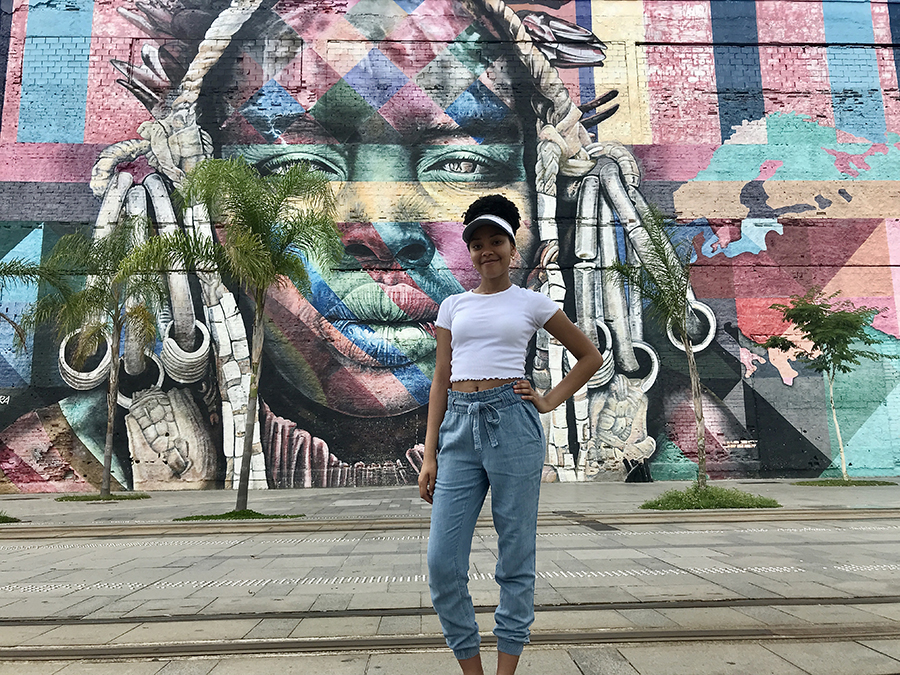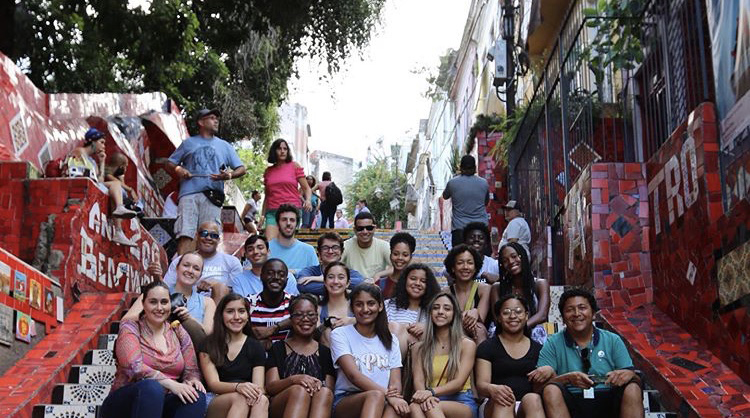Jessica Babb - The Untold Brazil Experience
 In May 2019, I went on a Maymester to Brazil with the Minority Engineering Program (MEP) and the Global Engineering Program and Partnerships (GEPP). As a black girl, I especially appreciated the program set-up because it allowed me to gain new cultural experiences while still feeling supported. I was aware that international prejudice can make studying abroad a challenging experience for many black students, but the program structure provided me with the support of other students and faculty of color while still offering me the incredible opportunity of immersing myself in a new culture.
In May 2019, I went on a Maymester to Brazil with the Minority Engineering Program (MEP) and the Global Engineering Program and Partnerships (GEPP). As a black girl, I especially appreciated the program set-up because it allowed me to gain new cultural experiences while still feeling supported. I was aware that international prejudice can make studying abroad a challenging experience for many black students, but the program structure provided me with the support of other students and faculty of color while still offering me the incredible opportunity of immersing myself in a new culture.
 During our trip, we visited Rio de Janeiro and Sao Paolo. I loved the beaches and laid back atmosphere of Rio de Janeiro, and we got to visit some of the city’s most famous landmarks, including the 98 foot statue of Christ the Redeemer that towers over the city from atop the Corcovado mountain. Sao Paolo had a surprisingly different feel, seeming to be far more dominated by the concerns of its business center but also had incredible museums and shopping areas. In both cities, we also had the opportunity to visit a variety of companies and learn about their practices, and it was the intersection of these cultural and business experiences that gave me the greatest understanding of Brazil’s culture—especially its ongoing struggles with racism.
During our trip, we visited Rio de Janeiro and Sao Paolo. I loved the beaches and laid back atmosphere of Rio de Janeiro, and we got to visit some of the city’s most famous landmarks, including the 98 foot statue of Christ the Redeemer that towers over the city from atop the Corcovado mountain. Sao Paolo had a surprisingly different feel, seeming to be far more dominated by the concerns of its business center but also had incredible museums and shopping areas. In both cities, we also had the opportunity to visit a variety of companies and learn about their practices, and it was the intersection of these cultural and business experiences that gave me the greatest understanding of Brazil’s culture—especially its ongoing struggles with racism.
Like the United States, Brazil is still dealing with the aftermath of years of African chattel slavery, and this terrible legacy was present almost everywhere I looked, from the favelas (slums) to the engineering companies we visited. Notably, the companies were nearly as void of faces of color as the favelas were full of them. It was a compelling visual testament to the lingering impact of racism in Brazil.
We students all noticed the lack of racial diversity at the companies we visited, and we didn’t hesitate to ask them about their lack of black employees and outreach programs to the black community. We heard a lot about the companies’ progress with recruiting and retaining (white) women, but the people we spoke with were largely unable to offer any insight into the lack of recruitment aimed at black employees. One employee, however, revealed that she had some black ancestry and explained that we didn’t see black employees because systemic racism in the country restricts black Brazilians from accessing quality education, which in turn restricts their access to high-paying jobs. For anyone who has grown up black in America, it is an old, old story, but I confess I was surprised to find the same story playing out a continent away. I think what struck me most was the lack of urgency that the companies seemed to feel about rectifying the racial disparities in their workforces.
 One company we visited did have an outreach program for underprivileged high school students (most of whom were, unsurprisingly, black and brown). We got to meet some of these students, and in seeing us—representatives of the Minority Engineering Program—they expressed an almost unanimous amazement that Purdue and the U.S. have so many black engineers. They seemed inspired by the sight of us, but I felt conflicted over their admiration because I knew that the impression they were taking away was largely inaccurate. In reality, black and minority engineers are a rarity at both Purdue and in our country at large. However, the language barrier made it difficult to explain this, and I’m not sure any of us were quite prepared to try to truly explain to those eager, hopeful faces what it’s like to be a black engineering student in the United States.
One company we visited did have an outreach program for underprivileged high school students (most of whom were, unsurprisingly, black and brown). We got to meet some of these students, and in seeing us—representatives of the Minority Engineering Program—they expressed an almost unanimous amazement that Purdue and the U.S. have so many black engineers. They seemed inspired by the sight of us, but I felt conflicted over their admiration because I knew that the impression they were taking away was largely inaccurate. In reality, black and minority engineers are a rarity at both Purdue and in our country at large. However, the language barrier made it difficult to explain this, and I’m not sure any of us were quite prepared to try to truly explain to those eager, hopeful faces what it’s like to be a black engineering student in the United States.
Although racial disparities in Brazil might not seem like an engineering problem, I believe that understanding (and rectifying) such disparities is a vitally important issue facing the engineering community. Top engineering talent can (or should) be found everywhere, and when an entire segment of the population is overlooked and under-recruited, that damages the engineering profession as a whole. Solving this problem starts with awareness, and that is what my trip to Brazil offered me: a greater awareness of the way that systemic racism and racial disparities continue to impact talented students all over the globe. My trip to Brazil showed me that, while different countries may have different foods and traditions, anti-blackness is global. My trip strengthened my resolve to be a part of the generation of engineers that designs companies which include and benefit a much wider range of people. While I found myself a little disheartened by my encounter with the truly global scale of racism, I’m also deeply grateful for my MEP-GEPP trip to Brazil for the way it opened my eyes to the necessity of adding my voice to the growing majority of voices calling for equity and diversity in the global engineering community.
